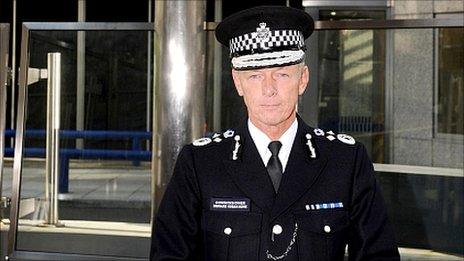Sir Bernard Hogan-Howe: Retiring Met chief reflects on job
- Published
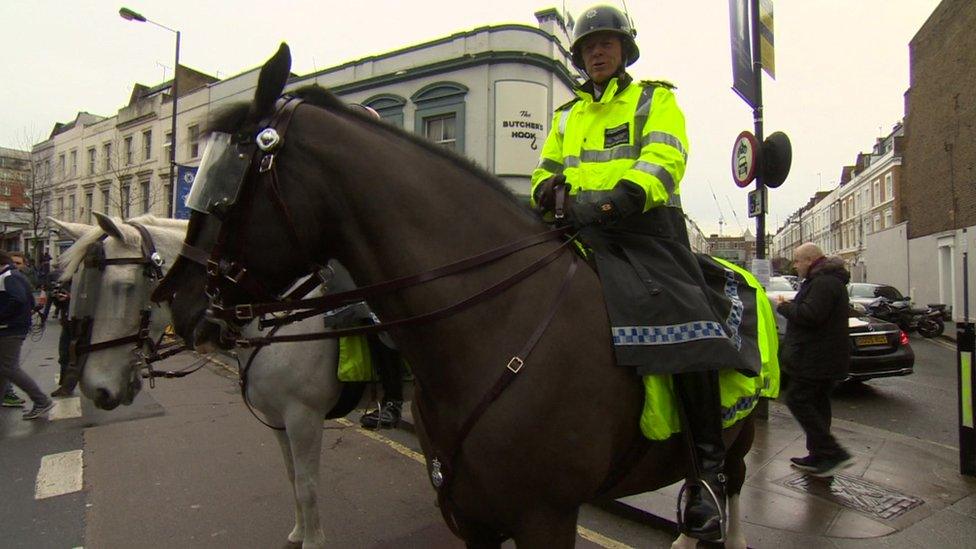
The outgoing Metropolitan Police commissioner volunteered in his spare time to police football games on horseback
The UK's top police officer is retiring after five-and-a-half years in charge of the Metropolitan Police. BBC London's Home Affairs correspondent Nick Beake joined him as he policed his last football match on horseback to discuss his highs and lows.
Sir Bernard Hogan-Howe is taking me to meet his favourite police horse, Oliver.
"He's a star. A lovely character. Brave," he says.
"Hello mate, you're looking well," he tells him as he strokes his dark brown mane.
"He seems to be loyal, takes everything in his stride and is not too demanding."
How does he compare with politicians?
"I've never ridden a politician, so I wouldn't know," chuckles the outgoing police chief.
Sir Bernard is in his element. After five-and-a-half years of gruelling 14-hour days, he will soon trot off into the grazing pastures of retirement.
More time for holidays with his wife Marion, walking, Game of Thrones and House of Cards, he later enthuses.
It's early Saturday morning in west London and the commissioner's day off. But he can't keep away. He's passionate about horse riding and is volunteering to police the Chelsea-Arsenal match as one of the mounted branch.
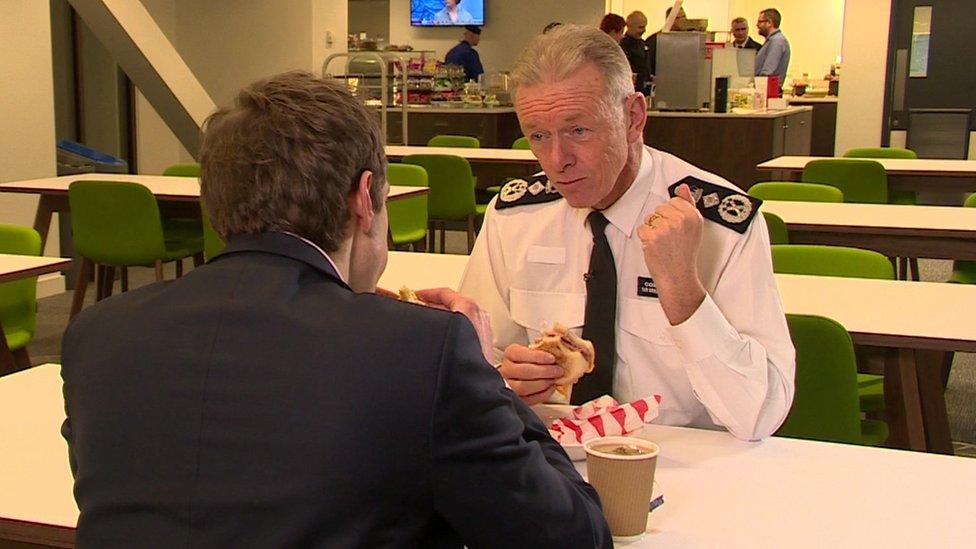
Sir Bernard Hogan-Howe, pictured in the police canteen, started his career in 1979
He may normally be in charge of 32,000 officers, but here he's one of the troops on the front line. Following this stint at Stamford Bridge, he has patrolled every football stadium in London.
Sir Bernard arguably rode to the rescue of the Met in autumn 2011. Scotland Yard had lost two commissioners in the space of three years - Sir Ian Blair had been ousted, external by Mayor Boris Johnson while Sir Paul Stephenson resigned amid the phone hacking scandal.
London had been burning - with riots igniting and spreading across 26 of the capital's 32 boroughs. "A terrifying" time, Sir Bernard admits. To try to build trust between the police and London's communities he ordered a reduction in the controversial police tactic of stop and search.
He also had to build a management team, after his predecessors found meetings and disagreements had been leaked. He chose "good people who were honourable" who were interested in "team, not ego".
He championed an approach called Total Policing which aimed to be "as nimble, thorough and ruthless" as the criminals, getting justice for victims.

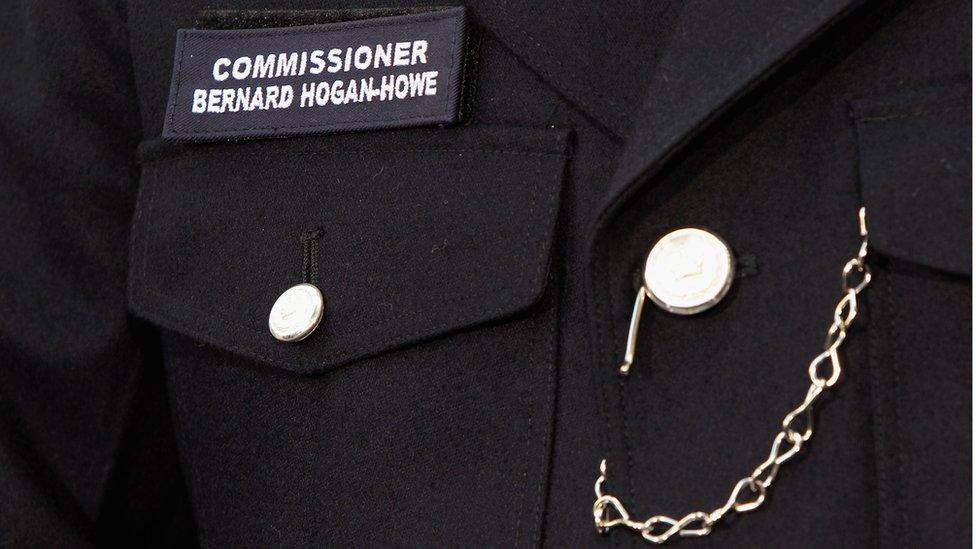
The highs
The Olympics passing off peacefully
No mass terrorist attack, unlike some European neighbours
The lows
A bungled inquiry into allegations of a VIP Westminster sex ring in the 1970s and 80s

Crime fell by a fifth during Sir Bernard's time in charge, although he admits he is worried by a recent rise, particularly in knife crime.
He puts this down to some of the 1,500 gang members arrested and jailed around the time he started the job now being released and back on the streets.
The day we meet, the commissioner is on the generally less-than-mean streets of Fulham, leading a dozen police horses through the high street, as fans stream to the stadium.
But it was the policing of a much bigger sporting event - the Olympics in 2012 - that was a high point for him. As the eyes of the world fixed on London, the spectacle passed without trouble.
During Sir Bernard's tenure, the menace from so-called Islamic State emerged, but there has been no mass terrorist attack - unlike in other major European cities such as Paris, Nice, Brussels and Berlin.
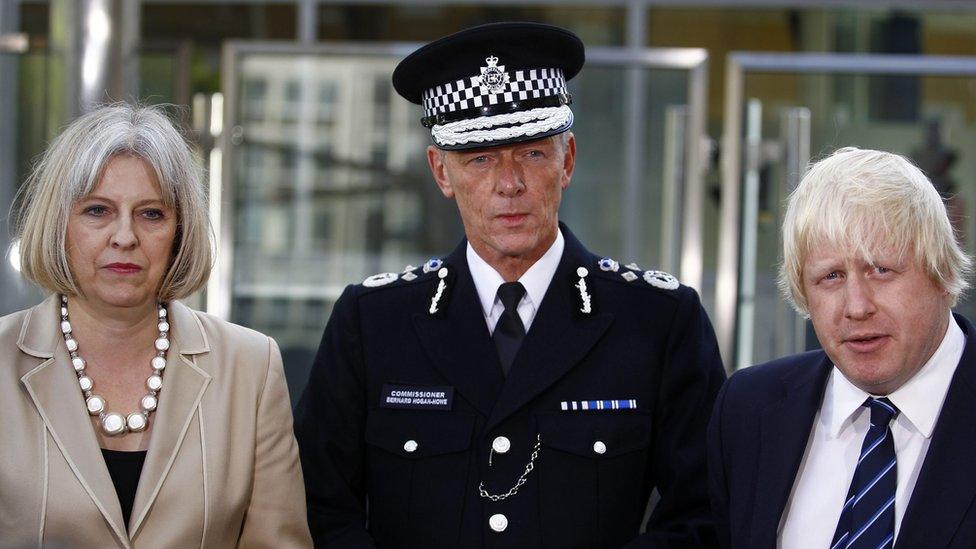
Sir Bernard Hogan-Howe joined as commissioner in 2011 when the Met had lost two commissioners in the space of three years
However, Sir Bernard has faced sustained and vociferous criticism in the press, particularly over the Met's handling of the bungled inquiry into allegations of a VIP sex ring at Westminster in the 1970s and 80s.
The commissioner had to visit the former head of the Army, Lord Bramall and former Home Secretary Lord Brittan's widow to apologise "for the intrusion into their homes and the impact... on their lives" after both men were accused but subsequently cleared.
Although the commissioner acknowledges the Met failed, he thinks the treatment he got from the press was a consequence of journalists being arrested for phone hacking and inappropriate payments to police and public officials.
He admits some criticism hurts, but how about when he reads in the paper that he's "the man who shames British policing, external"?
"You know it's untrue and they've got an agenda. They've had a go at a lot of people, but they've not always had a good look at themselves," he says.
"And I think if they looked themselves in the mirror sometimes, they'd know that we've been on the side of right and they haven't."
It's a bold claim, as on his watch in 2014 a public inquiry into undercover policing was launched. Last week, the police watchdog said it was investigating why documents were shredded weeks after the inquiry was announced and despite Sir Bernard ordering no evidence be destroyed.
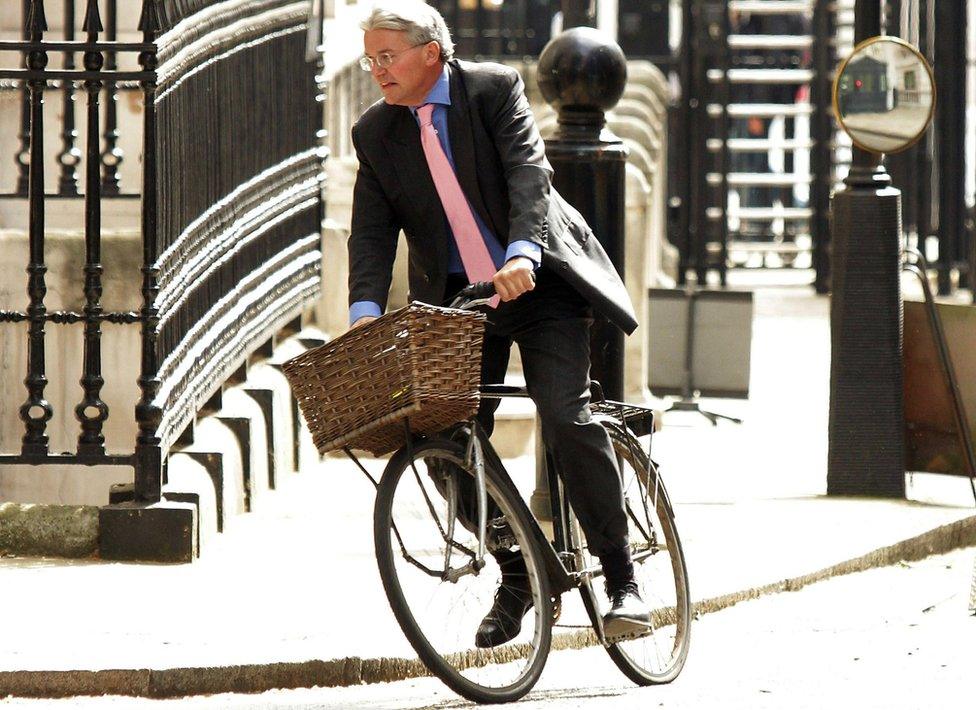
The Met faced the allegation the police conspired to remove the government's chief whip in 2012. The police officer at the centre of the row accepted damages from Andrew Mitchell in 2015
If his message was ignored it would be an uncomfortable moment for the Yorkshireman who prides himself on a clear idea of what's right and wrong. Something he inherited from his mum Celia, who raised him as a single parent.
"She was my inspiration really. She was the one who got me through everything. She had to fight on my behalf."
He regrets she did not live to see him knighted or become head of the Met.
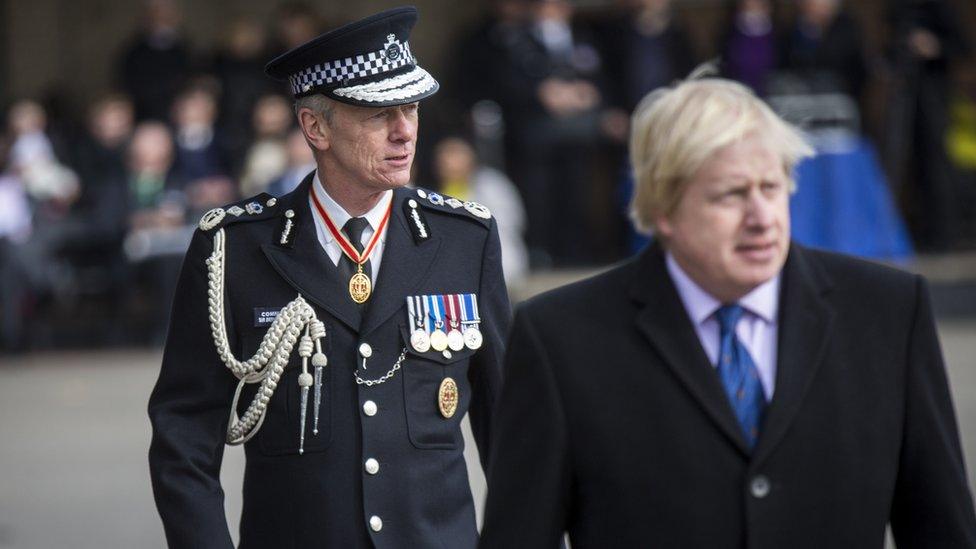
He describes former London mayor Boris Johnson as "a joy, loyal and very intelligent"
"Sadly she died in 2002. But I know she'd be looking down and she'd still be looking after me - she'd never let anyone pick on me."
So how about the politicians who have picked a fight with him?
He was once asked by a group of schoolchildren what the worst thing was about his job. He replied: "Have you ever seen anything called the Home Affairs Select Committee? I can get quite angry sometimes because some of the questions seem pretty silly."
If some Westminster MPs have left him exasperated, he's got no criticism for the two London politicians he's worked with most closely, mayors Boris Johnson and Sadiq Khan.
"Boris has been a joy, loyal and very intelligent. Every meeting I've left him and I've felt better. When we've had some difficulties he's always been loyal."
And Mr Khan, the new mayor who only extended Sir Bernard's contract for a year?
"Different type of person. Also a bright guy, a human rights lawyer who took on the police. Affable. Driven by some great passion - social justice. I think it's a great mark that this city has a Muslim mayor. "
How would Sir Bernard describe himself in three words? "Policeman, challenging, caring."
As he guides Oliver his horse back towards Stamford Bridge, a little girl in a tutu runs up to say hello. It turns out she's off to the cinema with her mum.
I ask the commissioner what his favourite film is and he replies: "The Magnificent Seven… the good guys win."
And with that, the man who's tried to protect this largest of British cities from the modern-day bandits of cyber and terror rides off into the west London sunset.
- Published29 September 2016
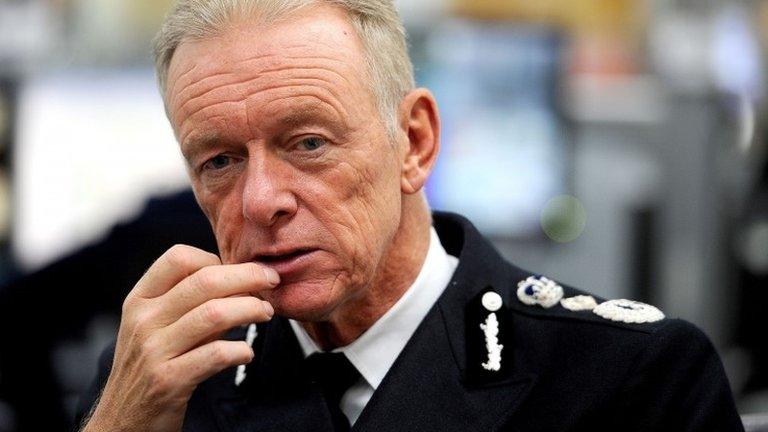
- Published29 September 2016
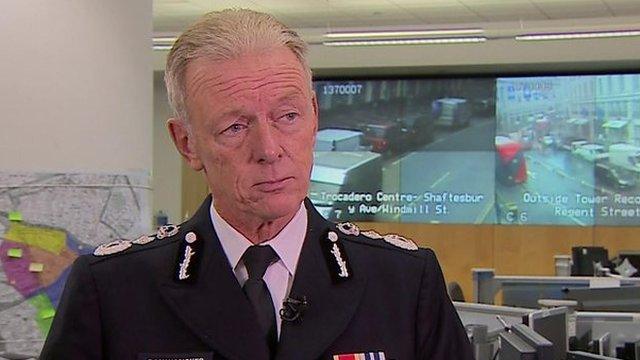
- Published11 August 2014
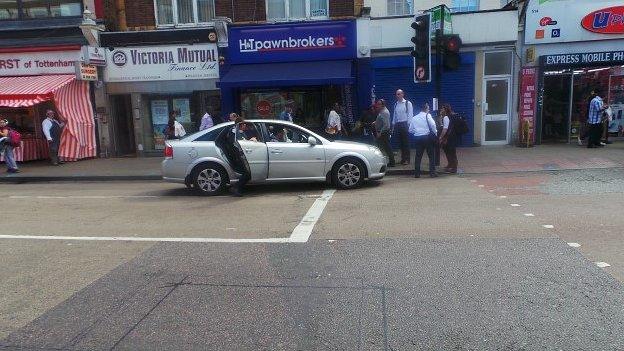
- Published12 September 2011
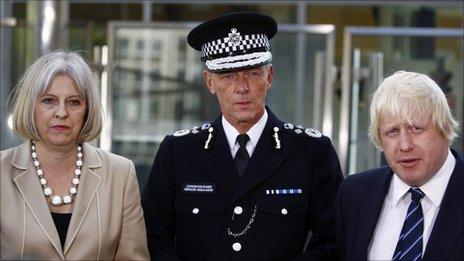
- Published12 September 2011
